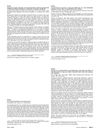 24 citations,
January 2020 in “International Journal of Molecular Sciences”
24 citations,
January 2020 in “International Journal of Molecular Sciences” Some plants with flavonoids may help treat hair loss and promote hair growth.
 24 citations,
January 2018 in “Journal of Visualized Experiments”
24 citations,
January 2018 in “Journal of Visualized Experiments” PRP injections effectively promote hair growth in androgenetic alopecia patients.
 18 citations,
May 2013 in “Annals of Dermatology”
18 citations,
May 2013 in “Annals of Dermatology” AGA increased yearly, type I most common, and family history and seborrheic dermatitis often linked.
 17 citations,
June 2012 in “Australasian Journal of Dermatology”
17 citations,
June 2012 in “Australasian Journal of Dermatology” Finasteride and low-dose dutasteride combo improves hair growth and reduces hair loss with no major side effects.
 16 citations,
June 2008 in “Springer eBooks”
16 citations,
June 2008 in “Springer eBooks” Over 50% of women over 50 experience hair loss, with minoxidil being the only proven effective treatment.
 15 citations,
January 2018 in “Acta dermato-venereologica”
15 citations,
January 2018 in “Acta dermato-venereologica” Finasteride and dutasteride increase sexual dysfunction risk by 1.57 times in male hair loss treatment.
 4 citations,
August 2013 in “Expert Review of Dermatology”
4 citations,
August 2013 in “Expert Review of Dermatology” Updated treatments for female hair loss include minoxidil, antiandrogens, hair transplants, and light therapy.
 1 citations,
January 2017 in “Journal of Community & Public Health Nursing”
1 citations,
January 2017 in “Journal of Community & Public Health Nursing” Wearing a cap doesn't affect quality of life for Indian men with hair loss, but severe hair loss does lower it. Older men have more severe hair loss, and those who wear caps more often want less treatment.
 August 2024 in “Research Square (Research Square)”
August 2024 in “Research Square (Research Square)” Using 5-alpha reductase inhibitors may lower the risk of breast cancer in females.
 February 2006 in “Journal of The American Academy of Dermatology”
February 2006 in “Journal of The American Academy of Dermatology” Most patients with anal Pemphigus Vulgaris had repeated episodes but fully recovered with treatment, without long-term problems.

Treatments for hair loss vary, but cell-based options may be the future.

AGA causes permanent hair loss; women use 2% minoxidil, men use 1 mg finasteride daily.

Finasteride and low-level laser therapy are similarly effective for frontal pattern hair loss.
 April 2008 in “Blackwell Publishing Ltd eBooks”
April 2008 in “Blackwell Publishing Ltd eBooks” AGA causes permanent hair loss; minoxidil helps men, finasteride helps men, minoxidil somewhat helps women, estrogens/antiandrogens lack evidence for women.
 218 citations,
December 2011 in “Advances in Urology”
218 citations,
December 2011 in “Advances in Urology” The document concludes that the 5 alpha-reductase enzymes are important in steroid metabolism and related to various human diseases, with inhibitors used to treat conditions like male pattern baldness and prostate issues.
 152 citations,
October 2010 in “Archives of Dermatology”
152 citations,
October 2010 in “Archives of Dermatology” Finasteride helps hair growth but may cause sexual side effects.
 136 citations,
February 2017 in “International Journal of Molecular Sciences”
136 citations,
February 2017 in “International Journal of Molecular Sciences” PRP treatment improves hair growth, and the device used can affect results, with some being more effective.
 129 citations,
October 2000 in “British Journal of Dermatology”
129 citations,
October 2000 in “British Journal of Dermatology” Finasteride helps increase hair growth in men with hair loss.
 66 citations,
June 2013 in “Journal of Dermatological Treatment”
66 citations,
June 2013 in “Journal of Dermatological Treatment” Finasteride and dutasteride effectively treat hair loss, but may cause side effects like sexual dysfunction and depression.
 51 citations,
October 2012 in “International Journal of Immunopathology and Pharmacology”
51 citations,
October 2012 in “International Journal of Immunopathology and Pharmacology” Finasteride works better than Serenoa repens for male hair loss.
 49 citations,
August 2003 in “Journal of The American Academy of Dermatology”
49 citations,
August 2003 in “Journal of The American Academy of Dermatology” Higher IGF-1 levels in hair follicles link to better finasteride results for hair loss.
 45 citations,
August 2019 in “Dermatologic Therapy”
45 citations,
August 2019 in “Dermatologic Therapy” Hair loss treatments work better with lifestyle changes.
 41 citations,
September 2014 in “JAMA Facial Plastic Surgery”
41 citations,
September 2014 in “JAMA Facial Plastic Surgery” Use finasteride, minoxidil, and follicular unit transplantation for hair loss treatment.
 41 citations,
April 2012 in “Journal of The European Academy of Dermatology and Venereology”
41 citations,
April 2012 in “Journal of The European Academy of Dermatology and Venereology” Dutasteride-containing mesotherapy effectively treats female hair loss, improving density and thickness with minimal side effects.
 33 citations,
August 2018 in “Facial Plastic Surgery Clinics of North America”
33 citations,
August 2018 in “Facial Plastic Surgery Clinics of North America” The document explains hair biology, the causes of hair loss, and reviews various hair loss treatments.
 32 citations,
January 2018 in “American Journal of Clinical Dermatology”
32 citations,
January 2018 in “American Journal of Clinical Dermatology” Hormone therapy affects hair growth in transgender individuals, with testosterone potentially causing hair loss in trans men and estrogen reducing facial/body hair in trans women; treatment options vary.
 32 citations,
April 1999 in “Expert Opinion on Investigational Drugs”
32 citations,
April 1999 in “Expert Opinion on Investigational Drugs” Finasteride effectively treats male hair loss, improving growth and density.
 29 citations,
September 2012 in “Dermatologic Clinics”
29 citations,
September 2012 in “Dermatologic Clinics” Hair disorders are caused by a complex mix of biology, genetics, hormones, and environmental factors, affecting hair growth and leading to conditions like alopecia.
 28 citations,
December 2003 in “Medical Hypotheses”
28 citations,
December 2003 in “Medical Hypotheses” Ketoconazole shampoo with finasteride improves hair density in men with hair loss.
 23 citations,
June 2014 in “Journal of Pharmaceutical Sciences”
23 citations,
June 2014 in “Journal of Pharmaceutical Sciences” Finasteride cream helps hair growth with less side effects.






























